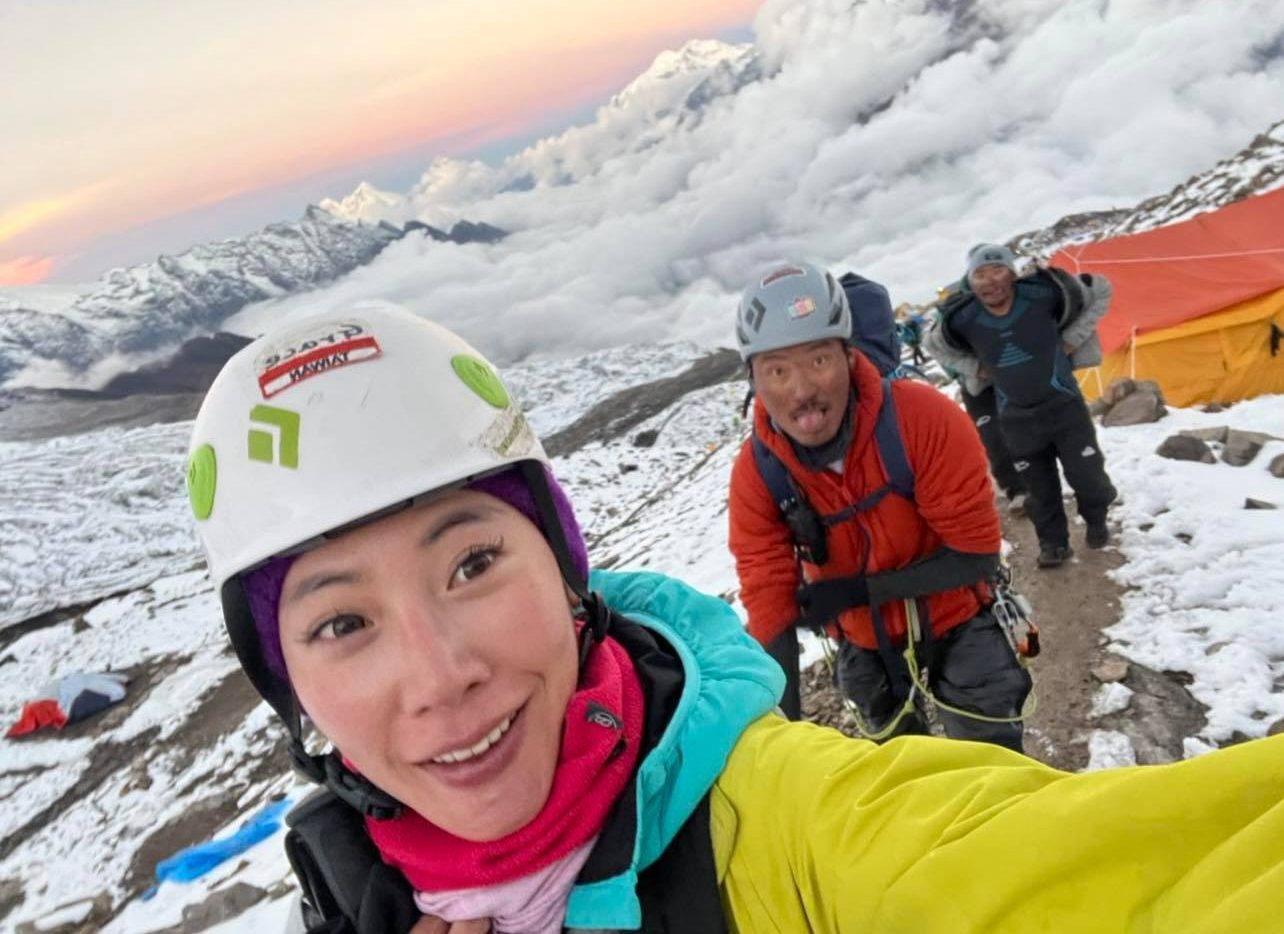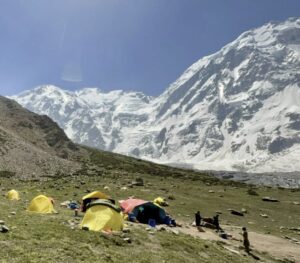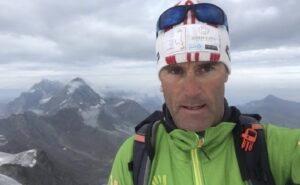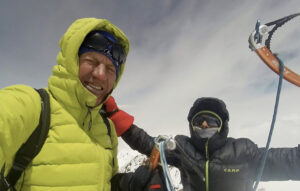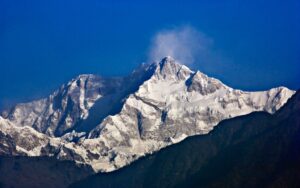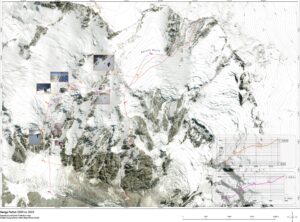Recent investigations cast doubts on Grace Tseng’s ascent of Kangchenjunga in the fall of 2021. She now admits that she fell short and will climb the mountain again.
Controversy has dogged the Taiwanese woman’s Himalayan climbs almost since the beginning: from her surprising attempt on Winter K2 in 2021-22, despite little experience, to her rush to summit all the 8,000’ers. But most of all, her claim to have summited a deserted Manaslu in just 13 hours without supplementary O2, with only her Sherpa guides as witnesses, has met intense skepticism.
The astonishing speed made headlines especially in Taiwan, drawing both loyal fans and fierce critics — some of the country’s best-known climbers among the latter. Yet it was her previous ascent of Kangchenjunga that in the end, was easier to disprove. Both specialized media and the 8000ers.com team showed that, wittingly or unwittingly, she fell short.

Grace Tseng on Manaslu. Photo: Grace Tseng
Tseng told ExplorersWeb that she trusted her Sherpa team to have led her to the summit. In the end, though, the photographic evidence was too clear, and Tseng is ready to admit it. “Yes, I hope to return to [Kangchenjunga] and climb it,” she told us.
So what happened on Kangchenjunga?

Tseng’s ‘summit’ picture on Kangchenjunga, with no geographical references. Photo: Grace Tseng
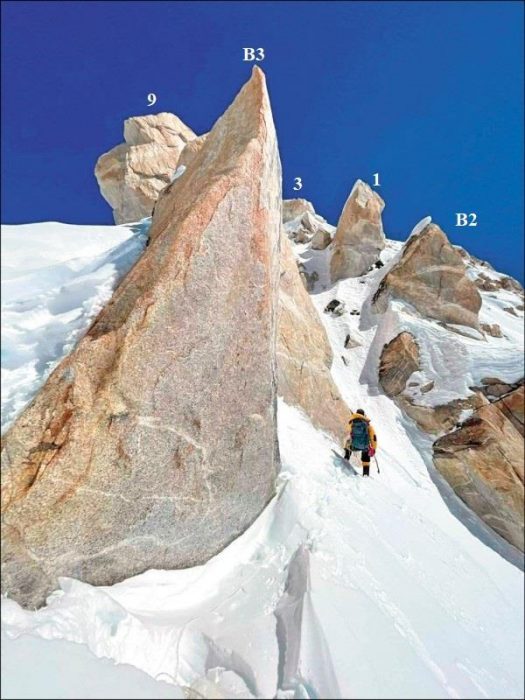
In this image, a member of Grace Tseng’s Kangchenjunga team approaches the Pinnacles. Rodolphe Popier of 8000ers.com has added geographical references (with numbers) for each feature.

Climbers on Kangchenguna’s upper slopes. The Pinnacles and physical features are marked, as well as the west side of the main summit. (W). Photo: Samuli Mansikka
Before returning to Kangchenjunga though, Tseng has to recover from recent knee surgery. Then she’ll have to find sponsorship. When controversy arose over her Manaslu claim, Tseng’s GoFundMe account was blocked. However, her expeditions, she noted, have relied more on business sponsorship than on crowdfunding.
Climbing on hold
“The most important thing now is my physical recovery,” Tseng said. “It’s been wrong for some time, this is why I was always slower on descents.”

Grace Tseng approaches a crag near home while recovering from knee surgery. photo: Grace Tseng/Instagram
Tseng is now back to jogging and strength training, but her ongoing recovery may not be fast enough to let her climb Everest in May as she had hoped.
Manaslu still unclear
While Tseng’s Kangchenjunga climb now seems resolved, her ascent of Manaslu in October 2022 remains unclear. Doubts arose immediately after her surprise summit announcement on Oct. 4. This occurred just one day after all the other teams descended because of dangerous avalanche conditions.
Tseng claimed that she used no O2 and needed only 13 hours from Base Camp to summit. This equaled the previous record set by elite athlete Francois Cazzanelli. Tseng provided a summit video and shortly after, some photos, but no GPS tracks.
The debate has continued since then, and several sources have investigated her claims. To each objection, Tseng countered with an explanation. Eventually, she provided GPS tracks, including further data that we requested. The track showed an unusually regular and fast pace, particularly on the upper sections. But it did detail her progress up the mountain.
She also shared that report in a long post on Facebook on Nov. 19, 2022. We have spoken to many of those involved, including Grace Tseng herself. Garmin issued an official statement saying that the company did not in any way edit the tracks logged by Tseng’s InReach device. Engineer Cedric Shih shared a report supporting the validity of the climber’s PDS log. Whether it was edited somehow by someone else, we simply can’t tell.

Some items featured on two pictures of climbers who summited Manaslu on Oct. 1. Source: Analytical Report of Grace Tseng’s Manaslu FKT Claim by Chang Yuan-Chih

These items also appear in the same location in Tseng’s Oct. 4 photos, although a heavy snowstorm reportedly hit the mountain on Oct. 2-3. Source: Analytical Report of Grace Tseng’s Manaslu FKT Claim by Chang Yuan-Chih
Equally, we lack the technological resources to state confidently whether Tseng’s summit photos might have been edited or combined with previous images from other climbers, as some critics have suggested. Check the complete report by climber and blogger Chang Yuan-Chih. He makes the case that several items pop up the snow in exactly the same place that they did in photos taken by climbers who summited Manaslu days earlier.
Besides her team, we haven’t found other Manaslu climbers willing to support Tseng’s claim.
“It is as if Tseng claimed that she can fly, and then we had to prove that humans can’t actually fly, in order to cast doubt on her claim,” fellow Taiwanese 8,000m climber FishTri told ExplorersWeb. “Grace [Tseng] has declined other climbers’ speed climb invitation in Taiwan by saying she performs better at high altitudes. But as we all know, climbers who do great at 8,000m also perform as well or better at sea level or at 3,000m. I sincerely hope she can do a climb in the public eye and we can witness her true strength.”
Eyes fixed on the next expedition
As we previously mentioned, we pay due respect to Grace Tseng and appreciate the experience and strength she acquired through her non-stop climbing throughout 2022. But her claim of 13 hours is so extraordinary, even compared to elite climbers, that it demands solid evidence.
We strongly suggest that she makes an extra effort to be transparent on her upcoming expeditions, especially if she aims for an FKT or some other record. Her willingness to climb Kangchenjunga again is a step in the right direction.
Mountaineering is not a regulated sport, but it does have its ethics and standards for honesty and transparency. While it lacks an authority to validate achievements, a worldwide climbing community pays close attention to all remarkable claims.
